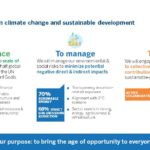Political leaders and financial sector give sustainable finance a new boost
Taking action against climate change and promoting sustainable development is not a fight to save the planet; it’s a fight for the human race. Olivier Guersent, Director-General at the European Commission asserted himself emphatically at the “Financing Sustainable Growth” conference held on March 22nd in Brussels with influential figures such as Emmanuel Macron, Michael Bloomberg, and Jean-Claude Juncker.

If we don't act now, the Earth will continue to exist, but it will be uninhabitable for human beings. This was one of the conclusions of the conference, which was attended by more than 800 people and took place shortly after the publication of the EC's Action Plan to encourage sustainable financing. The conference was organized to dovetail with the March EU Summit where European Union heads of state addressed the Capital Markets Union, which provides the framework for Europe's sustainable finance initiatives.
BBVA was one of the organizations invited by EC Vice-President, Valdis Dombrovskis, to participate in the event and was represented by Antoni Ballabriga, BBVA's Global Head of Responsible Business. After unveiling its strategy on climate change and sustainable development on February 28th, BBVA couldn't miss this important event. In addition to announcing an allocation of 100 billion euros between now and 2025 to green financing, sustainable infrastructure, social entrepreneurship and financial inclusion, the Group committed to work, in accord with Europe's approach and proposals, to mitigate environmental and social risks, minimizing potentially negative direct and indirect impacts.
BBVA's conviction and continued efforts to contribute to the much-needed transition to a low-carbon economy has positioned it as a model organization in regard to sustainable financing. Proof of this is its affiliation with a group of 16 banks that committed themselves as part of the United Nations environmental program finance initiative (UNEP-FI) to implement recommendations for financial outreach related to the climate, published by the Financial Stability board under the G20.
The recent appointment of Antoni Ballabriga as president of the European Banking Federation’s Sustainable Finance Working Group is another recognition of BBVA's efforts in the field of sustainability. This group, which met for the first time under BBVA's stewardship on March 21st, has committed itself to establish a strategy that will allow it to efficiently contribute to the technical debates spearheaded by the European Commission within the framework of the Action Plan for sustainable development financing.

Sustainable growth is a key priority and finance plays a fundamental role in reaching the sustainable development objectives from the United Nation’s 2030 Agenda and the Paris Agreement. This was the key message shared at the conference. In this context, President Juncker insisted on the need to reform the financial system so that it is prepared for the future economy.
Michael Bloomberg, recently appointed United Nations Special Envoy for the Climate Action, with his participation confirmed that capital markets are one of the most powerful tools in the fight against climate change, and he avowed that Donald Trump’s decision to pull out of the Paris accord had only promoted and accelerated private sector and local level actions and coalitions in favor of the climate. He insisted that Europe is not alone in this fight, and that the United States continues to be a powerful ally.
For his part, Emmanuel Macron highlighted the importance of the establishment of a European minimum price for carbon, accompanied by a cross-border tariff on CO2. The EU’s Emissions Trading System is the largest market for carbon in the world, but according to the French president, the price assigned to CO2 is too low to incentivize investment in clean technologies. He also called for a prudential regulation that takes into consideration risks related to clima. Furthermore, he advocated for regulation to be applied to all market participants, including shadow banking and underscored the importance of ensuring coherence between the European policies that make up the EU’s climate ambitions as a whole, and other elements such as the European budget and trade policy with non-member countries.
.@JunckerEU never again short term profits should weight on our long term future. We want to have a systemic change in our investment culture. #Sustainability must define our financial system. #SustainableFinanceEU #CMU pic.twitter.com/uSZ0oHi3vT
— Valdis Dombrovskis (@VDombrovskis) 22 de marzo de 2018
Vice President Dombrovskis confirmed the priority of sustainable finance in the European regulatory agenda and presented the “Action Plan: Financing sustainable development”, published by the Commission on March 8, an initiative that was well received by the group of participants.
The adoption of this roadmap, based largely on the recommendations published last January 31st by the High Level Expert Group on Sustainable Finance (HLEG), marks an important milestone in Europe's strategy to promote financial sustainability. It proposes ten actions with concrete measures to improve finance's contribution to sustainable growth and inclusion, and to incorporate environmental, social, and governance criteria in investment decision making.
At BBVA we believe the European Action Plan is the foundation on which to develop future necessary measures to integrate social and environmental criteria into the financial system, and therefore it represents a relevant step in the right direction. It is a process of transition that requires the participation of everyone, and BBVA will continue to working to fulfill its environmental commitments as announced and ensure its contribution to the sustainability of the economy, the society and the planet where we live.